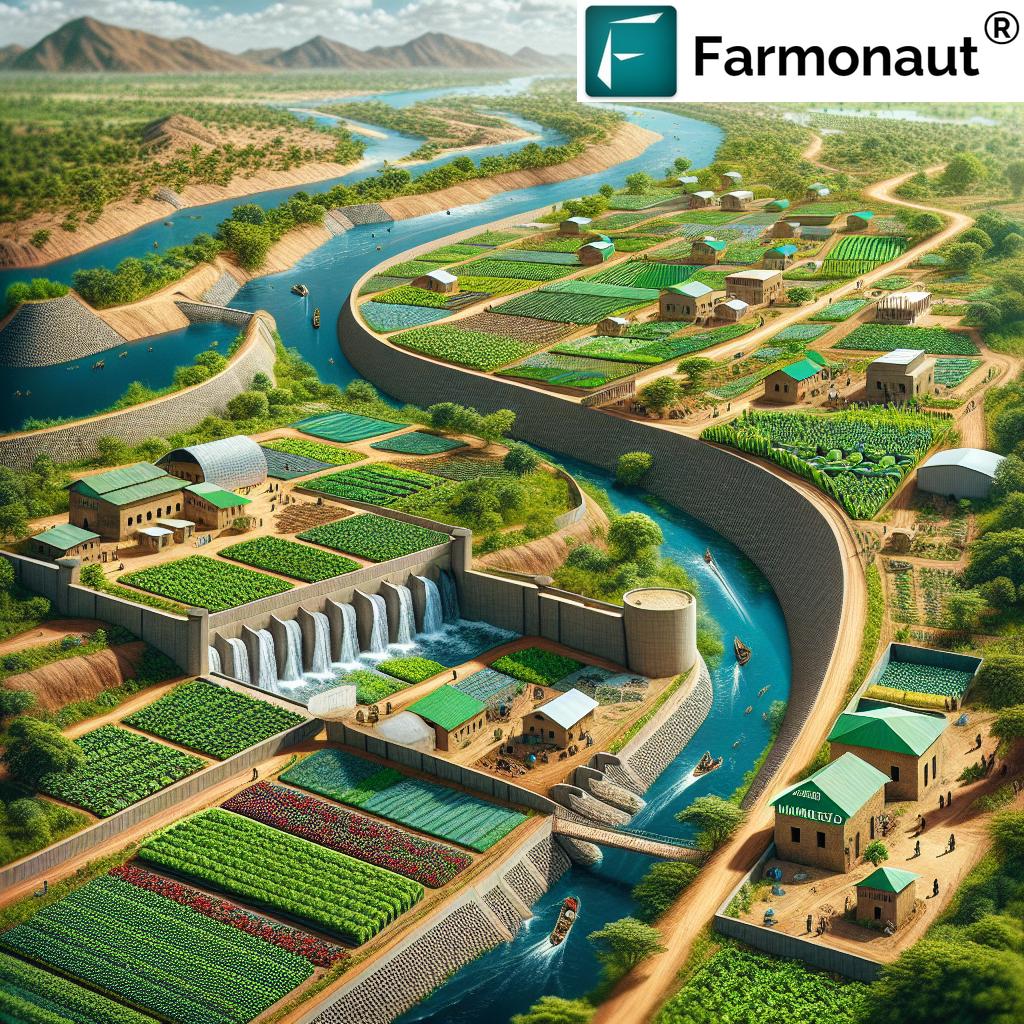7 Strategies for Water & Food Security in Kano, Jigawa Agriculture
“Kano and Jigawa’s sustainable irrigation systems have increased crop yields by up to 30% in the past five years.”
Introduction: The Urgency of Water & Food Security in Kano and Jigawa Agriculture
Addressing water and food security in northern Nigeria, especially the states of Kano and Jigawa, has become one of the most pressing development priorities for the region. Increasing population, climate uncertainties, and evolving agricultural demands have amplified the challenges facing our communities, farmers, and agencies responsible for sustainable growth in the agricultural sector. Under the leadership of the newly appointed Managing Director (MD) of Hadejia Jama’are River Basin Development Authority (HJRBDA), Rabiu Suleiman Bichi, significant new strategies and reforms are shaping state, regional, and national food systems for greater resilience and productivity.
In this comprehensive blog post, we will explore seven core strategies currently transforming irrigation systems, water resource management, agricultural development, and food security initiatives in Kano and Jigawa. Additionally, we will discuss how technological advancements—such as those pioneered by Farmonaut—are revolutionizing modern farming techniques and supporting environmental sustainability in agriculture.
“Over 60% of new agricultural projects in Kano and Jigawa now prioritize water resource management for food security.”
Setting the Stage: The Driving Forces Behind Water & Food Security
Kano and Jigawa are pivotal to Nigeria’s agro-ecosystem, housing millions who depend on farming for their livelihoods. The Hadejia Jama’are River Basin Development Authority (HJRBDA)—overseen by the Federal Ministry of Water Resources—has played a decisive role in regional development since 1976, focusing on surface and underground water resources, dam construction, irrigation systems, and technical support to farmers. The new leadership, anchored by Mr. Bichi, is advancing President Tinubu’s Renewed Hope Agenda to bridge gaps in food production, support youth empowerment, and foster sustainable growth.
The key performance indicators (KPIs) for the agency include a 20% boost in water-use efficiency through Integrated Water Resource Management (IWRM), a leap in irrigated agriculture coverage from 54,000 to 240,000 hectares, dam rehabilitation, a projected 30% annual crop yield improvement, and satisfaction among 85% of local communities. These efforts are not only vital for bridging the gap between rice millers’ demand and current national production but also for stabilizing food security across northern states like Kano and Jigawa.
Throughout this discussion, we will localize examples and best practices to Kano and Jigawa, reflecting the leadership vision of Bichi, state government policies, and community-driven progress towards resilient agriculture.
Strategy 1: Integrated Water Resource Management (IWRM) for Agricultural Resilience
Integrated Water Resource Management (IWRM) lies at the heart of sustainable agricultural development in northern Nigeria. By synchronizing water use across surface and underground resources, optimizing irrigation, and establishing collaborative frameworks, IWRM tackles water scarcity and maximizes crop productivity in Kano and Jigawa.
Key Components of IWRM Implementation:
- Holistic Planning: Centralized basin management by the agency ensures equitable allocation based on crop type, soil quality, and local needs.
- Optimized Irrigation Scheduling: Utilizing data-driven assessment for scheduling irrigation, saving water while maintaining yields.
- Stakeholder Inclusion: Farmers, community leaders, engineers, state and federal officials collaborate in decision-making.
- Monitoring and Evaluation: Application of advanced satellite technology (e.g., Farmonaut’s Large Scale Farm Management platform) enables accurate insights into water distribution, usage, and crop health across the region.
By integrating advanced farm management solutions into IWRM, regional authorities achieve active tracking of surface and underground water flows, enabling rapid intervention during drought or flood events, and enhancing the overall resilience of agricultural systems across Kano and Jigawa.
How Farmonaut’s Satellite Technology is Revolutionizing Land Use in Agriculture
Strategy 2: Optimized and Sustainable Irrigation Systems in Kano and Jigawa
Irrigation systems in Kano and Jigawa form the backbone of agricultural productivity and food security. Upgrading infrastructure and transitioning to sustainable irrigation practices ensures efficient water usage, higher yields, and enhanced resilience to climate shocks.
Modern Irrigation Solutions:
- Drip and Sprinkler Systems: Reducing evaporation and water wastage by directing water precisely to crop roots; supported by real-time irrigation analytics.
- Laser Leveling: Prepares fields for uniform water distribution and conservative usage.
- Remote Monitoring: Tools like Farmonaut’s satellite-driven field health monitoring assist in fine-tuning irrigation schedules based on crop requirements and environmental variables.
With the expansion of rehabilitated irrigation schemes, there is a planned increase in coverage to 240,000 hectares, expected to boost local and national food crop outputs, notably rice and vegetables, closing the production gap significantly.
Discover Farmonaut’s Advanced Agri Solutions: Precision Crop Area Estimation
Environmental and Social Impact:
- Reducing Dependency: Improved systems reduce reliance on erratic rainfall in states with variable climate patterns.
- Empowering Farmers: Training thousands of youths in irrigation installation and maintenance creates jobs while supporting backbone food production.
For developers: Automate irrigation data with the Farmonaut Satellite & Weather Data API (API Developer Docs).
Strategy 3: Dam Rehabilitation & Expansion for Enhanced Surface and Underground Water Resources
Dam rehabilitation is a cornerstone for securing reliable water supply in Kano and Jigawa. Bichi’s agenda includes robust rehabilitation programs focused on increasing dam water retention capacity through de-silting and engineering upgrades, directly supporting year-round irrigation and reducing water scarcity risks.
Major Focus Areas:
- De-silting and Maintenance: Restoring and enhancing the capacity of existing dams allows better control over surface water flows and reduced flood risks.
- Expansion of Dams: Construction of new dams in strategic locations expands access to reliable water for both agriculture and local communities.
- Modern Monitoring Tools: Satellite-based monitoring platforms (like Farmonaut’s carbon footprint and environmental monitoring solutions) help optimize maintenance schedules and assess dam integrity, promoting environmental sustainability.
Improved dam systems mean more secure irrigation for larger crop areas, helping achieve crop production targets and strengthen food security across northern states.
Farmonaut – STEI Foundation Africa Collaboration
Strategy 4: Implementation of Modern Farming Techniques for Crop Yield Improvement
Adopting modern farming techniques is essential to realizing the goal of a projected 30% year-on-year increase in yields, as outlined in Bichi’s management agenda. Advanced agricultural methods, precision field management, and better extension services are equipping farmers in Kano and Jigawa to improve productivity and resource efficiency.
Key Practices and Innovations:
- Precision Agriculture Tools: Leveraging real-time crop monitoring and AI-based advisory systems through platforms like Farmonaut helps minimize input wastage, detect stress early, and optimize fertilizer and pest application.
- Improved Crop Varieties: Introducing drought-tolerant and high-yield varieties tailored for the region’s agroecology, boosting resilience and stability.
- Conservation Agriculture: Practices such as minimum tillage, crop rotation, and cover cropping preserve soil moisture and fertility, further enhancing yields.
With continuous training and technical support, local communities are embracing these new methods for better results, while digital traceability (e.g., blockchain traceability solutions) strengthens food system integrity from farm to market across Nigeria and beyond.
The Role of Artificial Intelligence in Agriculture – Farmonaut | Agritecture | Joyce Hunter
Benefits of Modernization:
- Optimized Inputs: Less fertilizer and pesticide wastage, benefiting environmental health and reducing costs.
- Increased Output: Yields rise, supporting regional food security initiatives in northern states.
- Data-Driven Decisions: Continuous productivity monitoring leads to swift action on emerging threats.
- Market Access: Blockchain traceability boosts consumer trust and opens premium food export markets.
Strategy 5: Youth Empowerment through Agriculture: Building a Next Generation of Agripreneurs
National food security and the sustainability of Kano and Jigawa agriculture depends on actively involving youth in the entire agricultural value chain. Under Bichi’s leadership, more than 5,000 young people are to be trained across the states in modern irrigation, greenhouse farming, hydroponics, bookkeeping, and market access skills.
Core Empowerment Activities:
- Technical Training: Youth receive hands-on education in the installation and maintenance of irrigation systems.
- Entrepreneurship Skills: Practical modules in agribusiness, bookkeeping, and market strategies prepare a new generation for self-employment and economic growth.
- Digital Literacy: Familiarization with tools like satellite-based field monitoring (e.g., Farmonaut’s agro-admin app) enables more informed farm operations.
- Cross-Cultural Collaboration: Programs enhance engagement, knowledge exchange, and regional cooperation.
This holistic approach to youth empowerment nurtures innovation, enhances agricultural practices, and is fundamental for rural development and stability in northern states.
To start leveraging precision technology for agricultural development, download the Farmonaut app for Android or iOS today!
Strategy 6: Strengthening Agricultural Value Chains & Access to Markets
An effective agricultural system in our region requires robust value chains linking production to processing, transportation, financing, and marketing. The HJRBDA is strengthening its support for farmers through:
- Partnerships with Financial Institutions: Collaborations with agencies like the Bank of Agriculture (BOA) and National Board for Technical Education (NBTE) ensure financial access and technical support for local ventures.
- Value-Added Agriculture: Training in post-harvest handling and food processing improves income and reduces storage losses.
- Access to Technology: Farmonaut’s fleet and resource management tools enhance delivery, supply chain transparency, and reduce operational costs.
- Traceability: Utilizing blockchain traceability solutions to improve trust, export competitiveness, and compliance with quality standards.
The transformation of agricultural value chains is a national priority, contributing to improved livelihoods and economic development across Kano, Jigawa, and the broader region.
Strategy 7: Climate-Smart & Environmental Sustainability Initiatives
Addressing environmental sustainability in agriculture is vital to managing unpredictable weather, declining natural resources, and the overarching threat of climate change. Kano and Jigawa have amplified their commitment to climate-smart practices through:
- Carbon Footprint Tracking: Innovative systems such as Farmonaut’s carbon footprint calculator guide farmers in monitoring and reducing greenhouse emissions.
- Soil Conservation and Agroforestry: Programs promoting minimal tillage, planting of cover crops, and integration of trees improve resilience and reverse land degradation.
- Flood Control in Northern States: Dam engineering, embankment strengthening, and wetland restoration reduce disaster risk and protect communities (HJRBDA’s basin-wide planning is pivotal).
- Community Gardens: Inspired by initiatives like “Every Home a Garden,” families across Kano, Jigawa, and Bauchi are contributing to improved nutrition security and environmental greening.
These initiatives foster a healthy coexistence between food production and natural ecosystems—central to sustainable agriculture practices for the future of northern Nigeria.
Strategy Impact Assessment Table
| Strategy Name | Estimated Implementation Cost (USD) | Expected Improvement in Water Security (%) | Expected Improvement in Food Production (%) | Main Challenge(s) |
|---|---|---|---|---|
| Integrated Water Resource Management (IWRM) | $1.5M – $2.5M/year | 20% | 10% | Stakeholder cooperation, technical capacity |
| Optimized Irrigation Systems | $10M – $15M (per large scheme) | 25% | 30% | Capital investment, technical training |
| Dam Rehabilitation & Expansion | $8M – $12M (per major dam) | 30% | 20% | Funding, ecosystem disturbance |
| Modern Farming Techniques | $1M/year | 10% | 30% | Farmer adoption, access to tech |
| Youth Empowerment Programs | $500k – $1M/year | 8% | 15% | Engagement, program sustainability |
| Value Chain Strengthening & Market Access | $1M – $2M/year | 5% | 15% | Linkages, logistics, finance |
| Climate-Smart & Sustainability Initiatives | $500k – $2M/year | 12% | 8% | Behavior change, monitoring |
Supporting Agricultural Development with Farmonaut’s Precision Technology
As we pursue the ambitious goals set by Mr. Bichi and the HJRBDA for Kano and Jigawa, integrating data-driven technology is indispensable. Farmonaut, a pioneer in agricultural technology, empowers farmers, executive agencies, and policy makers in northern Nigeria with the following precision tools:
-
Satellite-Based Crop Health Monitoring: Real-time insights into vegetation health (NDVI), soil moisture, and resource status for proactive management of every farm plot in Kano, Jigawa, and Bauchi.
Benefit: Optimizes resource allocation, reduces water wastage, and enables early detection of crop stress. - AI Advisory Systems: The Jeevn AI Advisory delivers personalized management strategies and weather forecasts directly to the farmer’s device, supporting improved productivity across the agricultural landscape.
-
Blockchain-Based Traceability: Promotes transparency in supply chains—critical for market expansion.
Explore more about this system and its benefits for compliance and consumer trust: Farmonaut Product Traceability -
Resource and Fleet Management: Enables larger agribusinesses to monitor vehicle usage, automate logistics, and reduce operational costs.
Streamline operations with: Farmonaut Fleet Management Tools -
Crop Loan Verification & Insurance: Satellite-based validation supports easier access to finance, minimizing fraudulent claims and enhancing food security funding.
Learn how this supports financial inclusion: Crop Loan and Insurance Solutions with Farmonaut - Environmental Sustainability Tools: Farmonaut Carbon Footprinting gives farmers, agribusiness, and agencies the power to track and reduce their environmental impact, ensuring compliance and international competitiveness.
These technologies contribute to all core strategies outlined above, accelerating the achievement of food and water security across Kano and Jigawa.
FAQ: Water & Food Security in Kano & Jigawa Agriculture
-
Q: What is the main focus of the new HJRBDA leadership under Bichi?
A: The focus is on delivering sustainable agricultural development and water resource management in Kano, Jigawa, and Bauchi through IWRM, dam rehabilitation, improved irrigation, youth empowerment, and food security strategies. -
Q: How do modern irrigation systems improve food security?
A: These systems optimize water usage, increase the efficiency of crop production, reduce dependence on rainfall, and support food supply even during climate stress events. -
Q: What role does Farmonaut play in regional agriculture?
A: Farmonaut provides satellite-based crop health monitoring, AI advisory, blockchain-based traceability, and precision resource and fleet management tools to farmers, agribusinesses, and agencies for improved decision-making and productivity. -
Q: Are there specific programs for youth in Kano and Jigawa?
A: Yes, at least 5,000 youths are to be trained in technical, managerial, and entrepreneurial skills, focusing on modern irrigation, greenhouse farming, and agro-business development. -
Q: What are the main challenges in improving water and food security?
A: These include funding, technical capacity, infrastructure maintenance, stakeholder engagement, climate variability, and slow technology adoption. -
Q: How can communities access Farmonaut’s solutions?
A: Farmonaut offers its services via Android, iOS, web apps and API, making it accessible to all categories of users—from smallholders to large agro-enterprises. Download links are provided in this blog.
Conclusion: Harnessing Collective Potential for Lasting Security
The agricultural future of Kano, Jigawa, and allied states hinges on our collective determination to drive sustainable irrigation, water resource management, and food security. The strategic vision championed by Mr. Bichi and the HJRBDA—aligned with state and federal priorities—represents a turning point for millions who depend on the sector for their livelihoods and well-being.
Successful implementation of these seven strategies will create an enabling environment for growth, resilience, and prosperity, positioning northern Nigeria as a model for agricultural development across Africa. By integrating advanced technologies provided by Farmonaut, local communities, agencies, and agribusinesses stand equipped to achieve new levels of productivity and sustainability in the region.
Ready to advance precision agriculture in your community? Start using Farmonaut’s solutions now.
Farmonaut Subscription Plans for Agricultural Management
Choose the right Farmonaut subscription for your farm, agribusiness, or agency and take the next step toward data-driven agricultural success in Kano, Jigawa, and beyond.


















